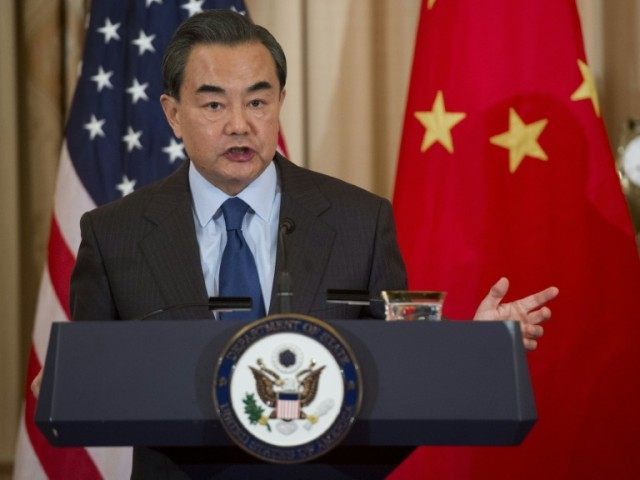In a press conference Tuesday, Chinese Foreign Minister Wang Yi struck a conciliatory tone regarding China’s militarization of disputed territory in the South China Sea, suggesting “maritime cooperation” with the United States and teasing that Beijing may invite foreign journalists to tour the region in question.
“After the facilities are completed and conditions there allow, we might consider inviting the press, including from foreign country, to make a field trip,” Wang told reporters of constructions underway in the Spratly and Paracel Islands, archipelagos China claims as exclusively its own.
Wang did not specify a timeline, nor has the Chinese government ever indicated a concrete time in which to expect the takeover of the region to end. The Chinese Foreign Ministry alleged in June 2015 that constructions on reefs in the Spratly Islands would “soon” be complete, but never issued a further announcement that they had ever been completed.
Wang took most of the time in his press conference to reiterate China’s stance that the entire region belongs to Beijing. China’s claims are disputed by five of its neighbors: the Philippines, Brunei, Malaysia, Taiwan, and Vietnam. The Philippines has brought the land reclamation case to the Permanent Court of Arbitration at The Hague, where China has vowed to disregard any verdict issued. “The Philippines’ stubbornness is clearly the result of behind-the-scene instigation and political manipulation,” Wang said of the international case on Tuesday.
“China was the earliest to explore, name, develop and administer various South China Sea islands. Our ancestors worked diligently here for generations,” Wang said in his press conference Tuesday. “History will prove who is the visitor and who is the genuine host.” He added that “China has never claimed and will not claim new territories.”
Wang also used some language that appeared intended to soften America’s stance towards China’s militarization of the region, suggesting that “when the U.S. truly cools down, it is entirely possible” to “conduct maritime cooperation” with Washington. “President Xi Jinping has pointed out time and again that when China and the U.S. work together, we can accomplish great things that benefit our two countries and the whole world,” he concluded.
The United States has adamantly rejected China’s claims in the region and begun work to dissuade China from colonizing the reefs and islands it has started to take over through “freedom of navigation” exercises confirming America’s presence in the region. U.S. Pacific Command chief, Admiral Harry Harris, has vowed more complex freedom of navigation exercises in the region, condemning China in February for its militarization of the region.
Harris’ remarks followed Wang’s visit to Washington in February, where he asserted in front of Secretary of State John Kerry that China owns all the territories it has colonized in the South China Sea. “The islands in the South China Sea have been China’s territory since ancient times, and China has the right to safeguard its territorial sovereignty,” Wang said then.
While Beijing has repeatedly denied that its constructions in the region are mainly for military use, it has recently admitted that some facilities will be for defense, after satellite images exposed the presence of surface-to-air missiles and fighter jets in the Paracel Islands, as well as the beginnings of an advanced radar surveillance system in the Spratly Islands.
China’s Global Times announced this week further construction in the Paracel Islands, territory largely belonging to Vietnam. “The improvement of infrastructure has protected the islands’ ecological environment, while the restoration work has significantly strengthened the islands’ capability against waves and erosion,” a Chinese communist party official is quoted as saying. The Global Times claims this construction will also protect Chinese fishermen, though it has been Vietnamese and Philippine anglers who have been the victims of Chinese violence.
Multiple incidents of Chinese vessels sinking private fishing boats belonging to Vietnamese nationals have been reported in the past two years. This month, Philippine fishermen reported that Chinese ships evacuated them from Jackson Atoll in the Spratly Islands, widely held to be Philippine territory.

COMMENTS
Please let us know if you're having issues with commenting.